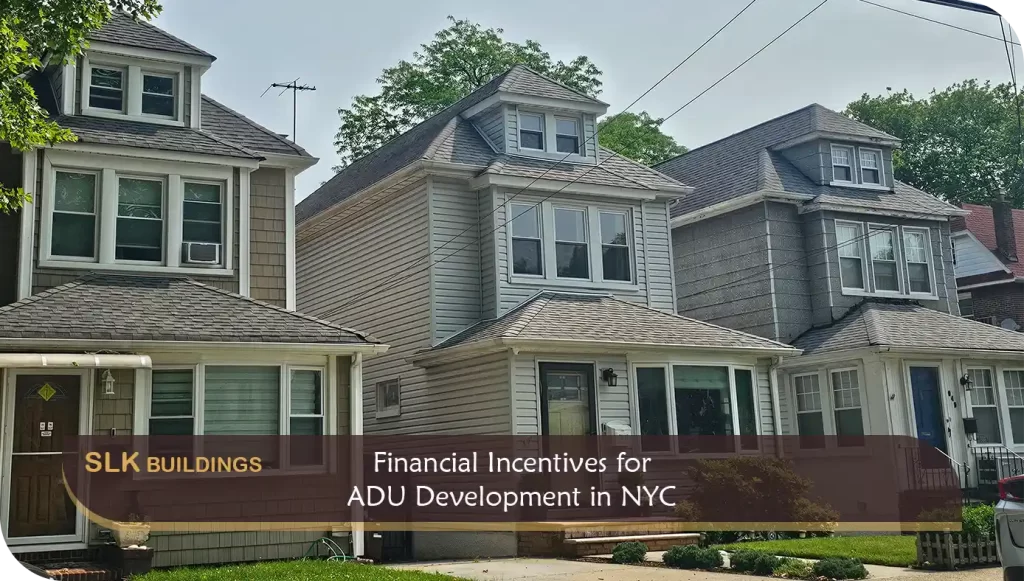Financial Incentives for ADU Development

Financial Incentives for ADU Development
As New York City grapples with a persistent housing shortage and soaring real estate costs, the development of Accessory Dwelling Units (ADUs) has emerged as a promising solution to address the city’s housing challenges. Recognizing the potential of ADUs to increase housing supply and promote affordability, the city and various organizations offer a range of financial incentives to support ADU development. In this post, we delve into the financial incentives available for ADU development in New York City in detail.
Low-Interest Loans and Financing Programs
- Home Repair Loans: Several organizations, including the New York City Housing Preservation and Development (HPD) and nonprofit lenders, offer low-interest loans to homeowners for home repairs and renovations, including ADU development. These loans often feature favorable terms and may be available to low- and moderate-income homeowners.
- Energy Efficiency Financing: Homeowners undertaking ADU development may qualify for financing programs that incentivize energy-efficient upgrades, such as insulation, HVAC systems, and energy-efficient appliances. These programs can help reduce energy costs and enhance the sustainability of ADUs.
RELATED ARTICLES
- Plus One ADU
-
What is ADU Housing? A Comprehensive Guide to Accessory Dwelling Units
-
Rental Income Opportunities: ADU Development in New York City
-
Multi-generational Living: ADU as a Solution for NYC Families
-
Design Considerations for NYC ADUs: Making the Most of Limited Space
-
New York City’s ADU Regulations: What Homeowners Need to Know
-
Unlocking New Opportunities: Exploring NYC DOB’s Accessory Dwelling Units (ADUs)
Financial Incentives for ADU Development in New York City
Why Choose SLK Buildings?
- Proven Track Record
- Diverse Clientele
- Integrated Services
- Client-Centric Approach
- Registered Representative
Call Us 212.888.3888
Proven Track Record: Over two decades of successful dealing with NYC Department of Buildings Rules and Regulations.
Diverse Clientele: Trusted by a broad spectrum of clients, from individual property owners, architects, engineers, attorneys, hospitality business owners, project management firms to large scale developers.
Integrated Services: A one-stop solution encompassing consultation, representation, documentation and compliance support. We manages the entire process, from determining applicability to Accessory Dwelling Unit qualification, filing your ADU application, coordinating with our Registered Architect or Professional Engineer partner, to the completion.
Client-Centric Approach: Tailored strategies that prioritized our clients’ unique needs and objectives.
Registered Representative: We are registered Filing Representative with Department of Buildings and Registered Representative with OATH (Office of Administrative Trials and Hearings) and familiar with the Rules of Practice for the OATH Hearings Divisions.
Financial Incentives for ADU Development in New York City
FINANCIAL INCENTIVES FOR ADU:
Tax Incentives and Abatements
- Property Tax Abatements: In certain areas designated for revitalization or affordable housing development, homeowners may be eligible for property tax abatements for ADU construction or rehabilitation projects. These abatements can provide significant savings over the long term, making ADU development more financially feasible.
- Historic Preservation Tax Credits: Homeowners with properties listed on the National Register of Historic Places or located within historic districts may qualify for tax credits for the rehabilitation of historic structures, including ADUs. These credits can offset a portion of the costs associated with preserving and restoring historic buildings.
Grant Programs
- Housing Preservation Grants: The New York City Department of Housing Preservation and Development (HPD) administers grant programs aimed at preserving and improving the city’s housing stock. These grants may be available to homeowners for ADU development projects that enhance housing quality and affordability.
- Community Development Block Grants (CDBG): CDBG funds allocated to the city by the federal government support a variety of community development activities, including housing rehabilitation and affordable housing initiatives. Homeowners in eligible neighborhoods may access CDBG funding for ADU development projects that align with community development goals.
Affordable Housing Programs
- Affordable Housing Lotteries: Some ADU projects may be eligible for inclusion in affordable housing lotteries administered by the city or affordable housing developers. Through these lotteries, low- and moderate-income individuals and families have the opportunity to rent or purchase ADUs at below-market rates, increasing access to affordable housing in the city.
- Affordable Housing Tax Credits: Developers of ADUs within affordable housing projects may qualify for federal and state Low-Income Housing Tax Credits (LIHTC), which provide incentives for the construction or rehabilitation of affordable rental housing. These tax credits can attract investment and help offset development costs.
Technical Assistance and Support Services
- Design and Construction Assistance: Nonprofit organizations, architectural firms, and community development agencies may offer design and construction assistance to homeowners undertaking ADU development projects. These services can help homeowners navigate the complexities of ADU design, permitting, and construction, maximizing the success of their projects.
- Financial Counseling and Workshops: Community organizations and government agencies often host financial counseling sessions and workshops to educate homeowners about available incentives and financing options for ADU development. These resources empower homeowners to make informed decisions and access the financial support they need to realize their ADU goals.
Navigating the financial landscape of ADU development in New York City can be complex, but with the array of financial incentives and support programs available, homeowners have access to resources that can significantly reduce the costs of ADU construction or rehabilitation. By leveraging these incentives and partnering with community organizations and government agencies, homeowners can unlock the potential of ADUs to expand housing opportunities, promote affordability, and contribute to the vibrancy of New York City’s neighborhoods.
Seeking Professional Guidance
Navigating New York City’s Department of Buildings (DOB) and NYC Housing Preservation & Development regulations for Accessory Dwelling Units can be complex and time-consuming. Homeowners and property owners are strongly encouraged to consult trusted architects, engineers, or legal advisors familiar with local zoning laws, building codes, and permit requirements. Partnering with experienced professionals like **SLK Buildings** ensures you stay compliant, avoid costly delays, and complete your ADU project with confidence. From initial feasibility studies and code compliance reviews to full DOB filing and expediting services, **SLK Buildings** is here to guide you through every step of the process.